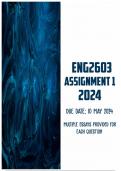, PLEASE USE THIS DOCUMENT AS A GUIDE TO ANSWER YOUR ASSIGNMENT
Please note that the author of this document will not responsibility for any plagiarizing you
commit.
Question 1 - Nervous Conditions by Tsitsi Dangarembga
1. Write an essay in which you compare and contrast the upbringing of Tambudzai and Nyasha
in Nervous Conditions. Your discussion must include how their different experiences inform
their attitudes towards Western and Shona cultures.
In Tsitsi Dangarembga's novel "Nervous Conditions," the characters Tambudzai and Nyasha
represent two distinct yet intertwined narratives of cultural identity and upbringing in colonial
Rhodesia (now Zimbabwe). Their upbringing, influenced by factors such as gender, education, and
exposure to Western ideals, shapes their attitudes towards both Western and Shona cultures. Through
a comparative analysis of their experiences, we gain insight into the complexities of cultural
assimilation and resistance in a post-colonial society.
Tambudzai, also known as Tambu, grows up in a rural Shona community, deeply entrenched in
traditional customs and values. Initially, Tambu's upbringing is marked by poverty and limited
opportunities, as she dreams of escaping her circumstances through education. However, her
aspirations are fueled by a desire for upward social mobility within the confines of her cultural
identity. Tambu's early life is characterized by obedience to patriarchal norms and a reverence for
tradition, evident in her acceptance of gender roles and respect for authority figures.
On the other hand, Nyasha, Tambu's cousin, is raised in a more affluent, Westernized environment
due to her parents' exposure to Western education and values. Nyasha's upbringing contrasts sharply
with Tambu's, as she experiences cultural dissonance between her Shona heritage and Western ideals.
Raised in England for a portion of her childhood, Nyasha embodies the complexities of cultural
hybridity, struggling to reconcile her African roots with Western notions of femininity and autonomy.
Nyasha's rebellious nature and defiance of patriarchal expectations reflect her internal conflict
between cultural assimilation and resistance.
The differing experiences of Tambu and Nyasha inform their attitudes towards Western and Shona
cultures in distinct ways. Tambu initially views Western education as a means of liberation from
poverty and oppression, valuing the opportunities it offers for personal and social advancement.
However, she remains deeply rooted in her Shona identity, embracing cultural traditions and norms
as sources of strength and resilience. Tambu's journey towards self-discovery is marked by a
negotiation of cultural values, as she navigates the complexities of identity formation in a rapidly
changing society.
In contrast, Nyasha's upbringing fosters a sense of alienation from both her Shona heritage and
Western culture. While she is privileged in terms of material comfort and educational opportunities,
Nyasha grapples with feelings of displacement and cultural estrangement. Her exposure to Western
ideals of individualism and self-expression clashes with the collectivist values of her Shona
upbringing, leading to a sense of cultural fragmentation and identity crisis. Nyasha's disillusionment
with both cultures manifests in her rebellious behavior and struggles with mental health issues,
highlighting the psychological toll of cultural assimilation and alienation.





